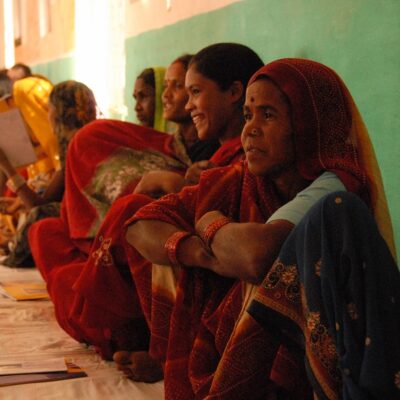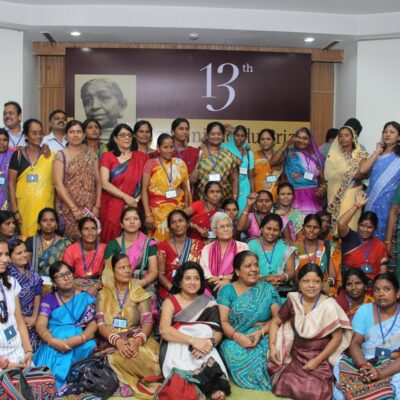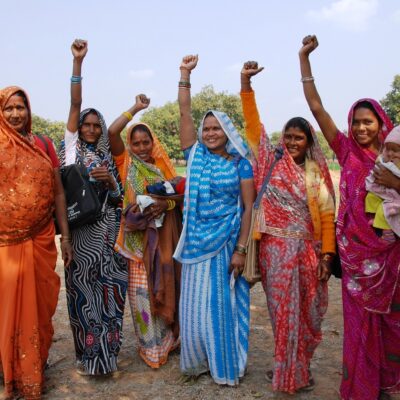Empowerment of women in India
Strengthening women in India in terms of their own potential for change has already achieved a great deal.
Factsheet: Strengthening Women’s Empowerment in India trough Electoral Processes (SWEEP)
Article: How the women found their voice
Women’s quota in the panchayats
One of the greatest social experiments of our time is underway in India: In 1992, the Indian government decided by law to delegate political power and resources in rural areas increasingly to elected local self-governing bodies, the so-called “panchayats”.
In particular, it was stipulated that at least one third of the panchayat deputies must be women. This is a revolutionary step with enormous implications. For the first time, women, whose lives have been marked for centuries by powerlessness, malnutrition and lack of education, have, at least in principle, the mandate and political influence to stand up with the villagers for their concerns and to mobilize state resources for this purpose.
The implementation of this law in practice is a great challenge. Deep-rooted, patriarchal and feudal structures often stand in the way. At the same time, women must first grow into their new roles. For example, it is a new experience for Indian women to raise their voice in a political assembly – this takes courage.
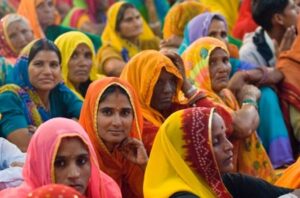
Support for elected representatives
OWithout appropriate training and support, these women in the panchayats have little chance of implementing their concerns – e.g. better nutrition, education, health, clean water, income-generating measures – in a male-dominated world.
The Hunger Project attaches great importance to the co-determination of these over 1 million women at regional and supra-regional level in the politics of their country – it sees this as a decisive development step in overcoming chronic hunger and poverty.
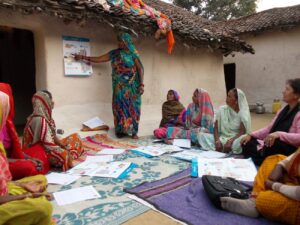
The four cornerstones of the Hunger Project in India
That is why the Hunger Project in India concentrates on strengthening women in the local self-governing bodies, the panchayats. This work has four strategic cornerstones:
- The Women’s Leadership Workshops for the elected women in the villages to strengthen their leadership skills and provide them with continuous support
- Formation of action alliances, cooperation and partnership with other like-minded organizations
- Increased and better media coverage through the annual award of the Sarojini Naidu Prize for the best coverage of the successes of the women delegates of the panchayats
- Mobilization of international support by the Hunger Project investors.
THP locations in India
Empowerment of women in India
Strengthening women in India in terms of their own potential for change has already achieved a great deal.
Factsheet: Strengthening Women’s Empowerment in India trough Electoral Processes (SWEEP)
Article: How the women found their voice
Women’s quota in the panchayats
One of the greatest social experiments of our time is underway in India: In 1992, the Indian government decided by law to delegate political power and resources in rural areas increasingly to elected local self-governing bodies, the so-called “panchayats”.
In particular, it was stipulated that at least one third of the panchayat deputies must be women. This is a revolutionary step with enormous implications. For the first time, women, whose lives have been marked for centuries by powerlessness, malnutrition and lack of education, have, at least in principle, the mandate and political influence to stand up with the villagers for their concerns and to mobilize state resources for this purpose.
The implementation of this law in practice is a great challenge. Deep-rooted, patriarchal and feudal structures often stand in the way. At the same time, women must first grow into their new roles. For example, it is a new experience for Indian women to raise their voice in a political assembly – this takes courage.

Support for elected representatives
OWithout appropriate training and support, these women in the panchayats have little chance of implementing their concerns – e.g. better nutrition, education, health, clean water, income-generating measures – in a male-dominated world.
The Hunger Project attaches great importance to the co-determination of these over 1 million women at regional and supra-regional level in the politics of their country – it sees this as a decisive development step in overcoming chronic hunger and poverty.

The four cornerstones of the Hunger Project in India
That is why the Hunger Project in India concentrates on strengthening women in the local self-governing bodies, the panchayats. This work has four strategic cornerstones:
- The Women’s Leadership Workshops for the elected women in the villages to strengthen their leadership skills and provide them with continuous support
- Formation of action alliances, cooperation and partnership with other like-minded organizations
- Increased and better media coverage through the annual award of the Sarojini Naidu Prize for the best coverage of the successes of the women delegates of the panchayats
- Mobilization of international support by the Hunger Project investors.
THP Standorte in Indien


